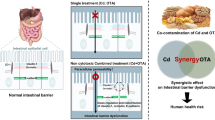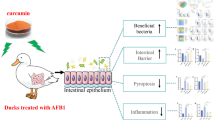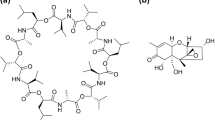Abstract
Aflatoxin M1 (AFM1) is a mycotoxin that is commonly found as a milk contaminant, and its presence in milk has been linked to cytotoxicity. The present study aimed to evaluate the acute cytotoxic effects of AFM1 on intestinal Caco-2 cells. Initially, we checked the morphology and viability of Caco-2 cells after treatment with different concentrations of AFM1 (5 ng/L, 50 ng/L, 250 ng/L, 500 ng/L, 1000 ng/L, and 2000 ng/L) for different time intervals (6 h, 12 h, and 24 h). It was found that AFM1 did not show any effect on cell morphology, but 10% decrease in viability above 1000 ng/L after 12 h. Furthermore, DCFDA assay showed increased ROS production after 6 h treatments. qPCR analysis showed an increased expression of epithelial-specific cytoskeleton marker genes, Cytokeratin, Villin, Vimentin, and JAM-1, and a decreased expression of tight junction protein genes, Claudin-1, Occludin, and ZO-1. Similarly, we found an increased expression of Cyp1a1 transcript with an increasing AFM1 concentration and incubation time. This gene expression analysis showed AFM1 can cause disruption of tight junctions between intestinal cells, which was further confirmed by a transwell experiment. In conclusion, consumption of AFM1-contaminated milk does not show any effect on cells morphology and viability but decreases the expression of intestinal barrier transcripts that may lead to the disruption of intestinal barrier function and leaky gut.







Similar content being viewed by others
Data availability
Data related to this research is available within the article or its supplementary materials.
References
Abbès S, Salah-Abbès JB, Abdel-Wahhab MA, Ouslati R (2010) Immunotoxicological and biochemical effects of aflatoxins in rats prevented by Tunisian montmorillonite with reference to HSCAS. Immunopharmacol Immunotoxicol 32(3):514–522. https://doi.org/10.3109/08923970903440176
Ahmed Adam MA, Tabana YM, Musa KB, Sandai DA (2017) Effects of different mycotoxins on humans, cell genome and their involvement in cancer. Oncol Rep 37(3):1321–1336. https://doi.org/10.3892/or.2017.5424
Alassane-Kpembi I, Kolf-Clauw M, Gauthier T, Abrami R, Abiola FA, Oswald IP, Puel O (2013) New insights into mycotoxin mixtures: the toxicity of low doses of Type B trichothecenes on intestinal epithelial cells is synergistic. Toxicol Appl Pharmacol 272(1):191–198. https://doi.org/10.1016/j.taap.2013.05.023
Alassane-Kpembi I, Puel O, Oswald IP (2015) Toxicological interactions between the mycotoxins deoxynivalenol, nivalenol and their acetylated derivatives in intestinal epithelial cells. Arch Toxicol 89(8):1337–1346. https://doi.org/10.1007/s00204-014-1309-4
Arango D, Al-Obaidi S, Williams DS, Dopeso H, Mazzolini R, Corner G, Byun DS, Carr AA, Murone C, Tögel L, Zeps N (2012) Villin expression is frequently lost in poorly differentiated colon cancer. Am J Pathol 180(4):1509–1521. https://doi.org/10.1016/j.ajpath.2012.01.006
Ayed-Boussema I, Pascussi JM, Maurel P, Bacha H, Hassen W (2012) Effect of aflatoxin B1 on nuclear receptors PXR, CAR, and AhR and their target cytochromes P450 mRNA expression in primary cultures of human hepatocytes. Int J Toxicol 31(1):86–93. https://doi.org/10.1177/1091581811422453
Bao XY, Li SL, Gao YN, Wang JQ, Zheng N (2019) Transcriptome analysis revealed that aflatoxin M1 could cause cell cycle arrest in differentiated Caco-2 cells. Toxicol in Vitro 59:35–43. https://doi.org/10.1016/j.tiv.2019.03.035
Battacone G, Nudda A, Cannas A, Borlino AC, Bomboi G, Pulina G (2003) Excretion of aflatoxin M1 in milk of dairy ewes treated with different doses of aflatoxin B1. J Dairy Sci 86(8):2667–2675. https://doi.org/10.3168/jds.S0022-0302(03)73862-4
Behm C, Föllmann W, Degen GH (2012) Cytotoxic potency of mycotoxins in cultures of V79 lung fibroblast cells. J Toxicol Environ Health A 75(19–20):1226–1231. https://doi.org/10.1080/15287394.2012.709170
Caloni F, Cortinovis C, Pizzo F, De Angelis I (2012) Transport of aflatoxin M1 in human intestinal Caco-2/TC7 cells. Front Pharmacol 3:111. https://doi.org/10.3389/fphar.2012.00111
Caloni F, Stammati A, Friggè G, De Angelis I (2006) Aflatoxin M1 absorption and cytotoxicity on human intestinal in vitro model. Toxicon 47(4):409–415. https://doi.org/10.1016/j.toxicon.2005.12.003
Carrozzino F, Pugnale P, Féraille E, Montesano R (2009) Inhibition of basal p38 or JNK activity enhances epithelial barrier function through differential modulation of claudin expression. Am J Physiol Cell Physiol 297(3):C775–C787. https://doi.org/10.1152/ajpcell.00084.2009
Chaudhary N, Agrawal H, Pandey M, Onteru S, Singh D (2018) Development and characterization of 2-dimensional culture for buffalo intestinal cells. Cytotechnology 70:361–373. https://doi.org/10.1007/s10616-017-0151-y
Chen F, Beezhold K, Castranova V (2009) JNK1, a potential therapeutic target for hepatocellular carcinoma. Biochim Biophys Acta Rev Cancer (BBA) 1796(2):242–251. https://doi.org/10.1016/j.bbcan.2009.06.005
Claeys L, Romano C, De Ruyck K, Wilson H, Fervers B, Korenjak M, Zavadil J, Gunter MJ, De Saeger S, De Boevre M, Huybrechts I (2020) Mycotoxin exposure and human cancer risk: a systematic review of epidemiological studies. Compr Rev Food Sci Food Saf 19(4):1449–1464. https://doi.org/10.1111/1541-4337.12567
Coch RA, Leube RE (2016) Intermediate filaments and polarization in the intestinal epithelium. Cells 5(3):32. https://doi.org/10.3390/cells5030032
Creppy EE (2002) Update of survey, regulation and toxic effects of mycotoxins in Europe. Toxicol Lett 127(1–3):19–28. https://doi.org/10.1016/S0378-4274(01)00479-9
da Rocha MEB, Freire FDCO, Maia FEF, Guedes MIF, Rondina D (2014) Mycotoxins and their effects on human and animal health. Food Control 36(1):159–165. https://doi.org/10.1016/j.foodcont.2013.08.021
Delie F, Rubas W (1997) A human colonic cell line sharing similarities with enterocytes as a model to examine oral absorption: advantages and limitations of the Caco-2 model. Crit Rev™ Ther Drug Carrier Syst 14(3). https://doi.org/10.1615/CritRevTherDrugCarrierSyst.v14.i3.20
Di-Tommaso N, Gasbarrini A, Ponziani FR (2021) Intestinal barrier in human health and disease. Int J Environ Res Public Health 18(23):12836. https://doi.org/10.3390/ijerph182312836
Furuse M, Hirase T, Itoh M, Nagafuchi A, Yonemura S, Tsukita S, Tsukita S (1993) Occludin: a novel integral membrane protein localizing at tight junctions. J Cell Biol 123(6):1777–1788. https://doi.org/10.1083/jcb.123.6.1777
Gao Y, Bao X, Meng L, Liu H, Wang J, Zheng N (2021) Aflatoxin B1 and aflatoxin M1 induce compromised intestinal integrity through clathrin-mediated endocytosis. Toxins 13(3):184. https://doi.org/10.3390/toxins13030184
Gao Y, Li S, Bao X, Luo C, Yang H, Wang J, Zhao S, Zheng N (2018) Transcriptional and proteomic analysis revealed a synergistic effect of aflatoxin M1 and ochratoxin A mycotoxins on the intestinal epithelial integrity of differentiated human Caco-2 cells. J Proteome Res 17(9):3128–3142. https://doi.org/10.1021/acs.jproteome.8b00241
Gao Y, Li S, Wang J, Luo C, Zhao S, Zheng N (2017) Modulation of intestinal epithelial permeability in differentiated Caco-2 cells exposed to aflatoxin M1 and ochratoxin A individually or collectively. Toxins 10(1):13. https://doi.org/10.3390/toxins10010013
Gao Y, Meng L, Liu H, Wang J, Zheng N (2020) The compromised intestinal barrier induced by mycotoxins. Toxins 12(10):619. https://doi.org/10.3390/toxins12100619
Gao YN, Wang JQ, Li SL, Zhang YD, Zheng N (2016) Aflatoxin M1 cytotoxicity against human intestinal Caco-2 cells is enhanced in the presence of other mycotoxins. Food Chem Toxicol 96:79–89. https://doi.org/10.1016/j.fct.2016.07.019
Giotakis AI, Dudas J, Glueckert R, Dejaco D, Ingruber J, Fleischer F, Innerhofer V, Pinggera L, Bektic-Tadic L, Gabriel SA, Riechelmann H (2021) Characterization of epithelial cells, connective tissue cells and immune cells in human upper airway mucosa by immunofluorescence multichannel image cytometry: a pilot study. Histochem Cell Biol 155:405–421. https://doi.org/10.1007/s00418-020-01945-y
Gonzalez-Mariscal L, Namorado MC, Martin D, Luna J, Alarcon L, Islas S, Valencia L, Muriel P, Ponce L, Reyes JL (2000) Tight junction proteins ZO-1, ZO-2, and occludin along isolated renal tubules. Kidney Int 57(6):2386–2402. https://doi.org/10.1046/j.1523-1755.2000.00098.x
Govaris A, Roussi V, Koidis PA, Botsoglou NA (2002) Distribution and stability of aflatoxin M1 during production and storage of yoghurt. Food Addit Contam 19(11):1043–1050. https://doi.org/10.1080/0265203021000007831
Hamid AS, Tesfamariam IG, Zhang Y, Zhang ZG (2013) Aflatoxin B1-induced hepatocellular carcinoma in developing countries: geographical distribution, mechanism of action and prevention. Oncol Lett 5(4):1087–1092. https://doi.org/10.3892/ol.2013.1169
Hsieh DP, Cullen JM, Ruebner BH (1984) Comparative hepatocarcinogenicity of aflatoxins B1 and M1 in the rat. Food Chem Toxicol 22(12):1027–1028. https://doi.org/10.1016/0278-6915(84)90160-1
Ilboudo S, Fouche E, Rizzati V, Toé AM, Gamet-Payrastre L, Guissou PI (2014) In vitro impact of five pesticides alone or in combination on human intestinal cell line Caco-2. Toxicol Rep 1:474–489. https://doi.org/10.1016/j.toxrep.2014.07.008
Kang LI, Wang Y, Suckow AT, Czymmek KJ, Cooke VG, Naik UP, Duncan MK (2007) Deletion of JAM-A causes morphological defects in the corneal epithelium. Int J Biochem Cell Biol 39(3):576–585. https://doi.org/10.1016/j.biocel.2006.10.016
Karantza V (2011) Keratins in health and cancer: more than mere epithelial cell markers. Oncogene 30(2):127–138. https://doi.org/10.1038/onc.2010.456
Kensler TW, Roebuck BD, Wogan GN, Groopman JD (2011) Aflatoxin: a 50-year odyssey of mechanistic and translational toxicology. Toxicol Sci 120:S28–S48. https://doi.org/10.1093/toxsci/kfq283
Kumar LK, Kapri A, Chandel R, Kumar V, Verma S, Vedamurthy GV, Singh D, Onteru SK (2022) Digestive propensity of aflatoxin M1 (4‐hydroxyaflatoxin B1), an indication from in vitro digestion model system. J Food Process Preserv 46(5):e16577. https://doi.org/10.1111/jfpp.16577
Livak KJ, Schmittgen TD (2001) Analysis of relative gene expression data using real-time quantitative PCR and the 2− ΔΔCT method. Methods 25(4):402–408. https://doi.org/10.1006/meth.2001.1262
Mandell KJ, Babbin BA, Nusrat A, Parkos CA (2005) Junctional adhesion molecule 1 regulates epithelial cell morphology through effects on β1 integrins and Rap1 activity. J Biol Chem 280(12):11665–11674. https://doi.org/10.1074/jbc.M412650200
Martìn-Padura I, Lostaglio S, Schneemann M, Williams L, Romano M, Fruscella P, Panzeri C, Stoppacciaro A, Ruco L, Villa A, Simmons D (1998) Junctional adhesion molecule, a novel member of the immunoglobulin superfamily that distributes at intercellular junctions and modulates monocyte transmigration. J Cell Biol 142(1):117–127. https://doi.org/10.1083/jcb.142.1.117
Mary VS, Theumer MG, Arias SL, Rubinstein HR (2012) Reactive oxygen species sources and biomolecular oxidative damage induced by aflatoxin B1 and fumonisin B1 in rat spleen mononuclear cells. Toxicology 302(2–3):299–307. https://doi.org/10.1016/j.tox.2012.08.012
Mary VS, Valdehita A, Navas JM, Rubinstein HR, Fernández-Cruz ML (2015) Effects of aflatoxin B1, fumonisin B1 and their mixture on the aryl hydrocarbon receptor and cytochrome P450 1A induction. Food Chem Toxicol 75:104–111. https://doi.org/10.1016/j.fct.2014.10.030
Mitic LL, Anderson JM (1998) Molecular architecture of tight junctions. Annu Rev Physiol 60(1):121–142. https://doi.org/10.1146/annurev.physiol.60.1.121
Monbaliu S, Van Poucke C, Detavernier CL, Dumoulin F, Van De Velde M, Schoeters E, Van Dyck S, Averkieva O, Van Peteghem C, De Saeger S (2010) Occurrence of mycotoxins in feed as analyzed by a multi-mycotoxin LC-MS/MS method. J Agric Food Chem 58(1):66–71. https://doi.org/10.1021/jf903859z
Moss MO (2002) Risk assessment for aflatoxins in foodstuffs. Int Biodeterior Biodegradation 50(3–4):137–142. https://doi.org/10.1016/S0964-8305(02)00078-1
Prandini A, Tansini GINO, Sigolo S, Filippi LAURA, Laporta M, Piva G (2009) On the occurrence of aflatoxin M1 in milk and dairy products. Food Chem Toxicol 47(5):984–991. https://doi.org/10.1016/j.foodcont.2011.05.013
Qasim M, Rahman H, Ahmed R, Oellerich M, Asif AR (2014) Mycophenolic acid mediated disruption of the intestinal epithelial tight junctions. Exp Cell Res 322(2):277–289. https://doi.org/10.1016/j.yexcr.2014.01.021
Rani P, Vashisht M, Golla N, Shandilya S, Onteru SK, Singh D (2017) Milk miRNAs encapsulated in exosomes are stable to human digestion and permeable to intestinal barrier in vitro. J Funct Foods 34:431–439. https://doi.org/10.1016/j.jff.2017.05.009
Reisinger N, Schürer-Waldheim S, Mayer E, Debevere S, Antonissen G, Sulyok M, Nagl V (2019) Mycotoxin occurrence in maize silage—a neglected risk for bovine gut health? Toxins 11(10):577. https://doi.org/10.3390/toxins11100577
Romero A, Ares I, Ramos E, Castellano V, Martínez M, Martínez-Larrañaga MR, Anadón A, Martínez MA (2016) Mycotoxins modify the barrier function of Caco-2 cells through differential gene expression of specific claudin isoforms: protective effect of illite mineral clay. Toxicology 353:21–33. https://doi.org/10.1016/j.tox.2016.05.003
Rumora L, Domijan AM, Grubišić TŽ, Peraica M (2007) Mycotoxin fumonisin B1 alters cellular redox balance and signalling pathways in rat liver and kidney. Toxicology 242(1–3):31–38. https://doi.org/10.1016/j.tox.2007.09.006
Sambuy Y, De Angelis I, Ranaldi G, Scarino ML, Stammati A, Zucco F (2005) The Caco-2 cell line as a model of the intestinal barrier: influence of cell and culture-related factors on Caco-2 cell functional characteristics. Cell Biol Toxicol 21:1–26. https://doi.org/10.1007/s10565-005-0085-6
Sangare-Tigori B, Moukha S, Kouadio HJ, Betbeder AM, Dano DS, Creppy EE (2006) Co-occurrence of aflatoxin B1, fumonisin B1, ochratoxin A and zearalenone in cereals and peanuts from Côte d’Ivoire. Food Addit Contam 23(10):1000–1007. https://doi.org/10.1080/02652030500415686
Santos RR, Oosterveer-van der Doelen MA, Tersteeg-Zijderveld MH, Molist F, Mézes M, Gehring R (2021) Susceptibility of broiler chickens to deoxynivalenol exposure via artificial or natural dietary contamination. Animals 11(4):989. https://doi.org/10.3390/ani11040989
Schulz MC, Schumann L, Rottkord U, Humpf HU, Gekle M, Schwerdt G (2018) Synergistic action of the nephrotoxic mycotoxins ochratoxin A and citrinin at nanomolar concentrations in human proximal tubule-derived cells. Toxicol Lett 291:149–157. https://doi.org/10.1016/j.toxlet.2018.04.014
Smith MC, Madec S, Coton E, Hymery N (2016) Natural co-occurrence of mycotoxins in foods and feeds and their in vitro combined toxicological effects. Toxins 8(4):94. https://doi.org/10.3390/toxins8040094
Stoev SD, Dutton MF, Njobeh PB, Mosonik JS, Steenkamp PA (2010) Mycotoxic nephropathy in Bulgarian pigs and chickens: complex aetiology and similarity to Balkan endemic nephropathy. Food Addit Contam 27(1):72–88. https://doi.org/10.1080/02652030903207227
Streit E, Schatzmayr G, Tassis P, Tzika E, Marin D, Taranu I, Tabuc C, Nicolau A, Aprodu I, Puel O, Oswald IP (2012) Current situation of mycotoxin contamination and co-occurrence in animal feed—focus on Europe. Toxins 4(10):788–809. https://doi.org/10.3390/toxins4100788
Sun G, Wang S, Hu X, Su J, Zhang Y, Xie Y, Zhang H, Tang L, Wang JS (2011) Co-contamination of aflatoxin B1 and fumonisin B1 in food and human dietary exposure in three areas of China. Food Addit Contam 28(4):461–470. https://doi.org/10.1080/19440049.2010.544678
Suzuki T (2013) Regulation of intestinal epithelial permeability by tight junctions. Cell Mol Life Sci 70:631–659. https://doi.org/10.1007/s00018-012-1070-x
Tan Z, Huang M, Puga A, Xia Y (2004) A critical role for MAP kinases in the control of Ah receptor complex activity. Toxicol Sci 82(1):80–87. https://doi.org/10.1093/toxsci/kfh228
Tatay E, Meca G, Font G, Ruiz MJ (2014) Interactive effects of zearalenone and its metabolites on cytotoxicity and metabolization in ovarian CHO-K1 cells. Toxicol in Vitro 28(1):95–103. https://doi.org/10.1016/j.tiv.2013.06.025
Tavares AM, Alvito P, Loureiro S, Louro H, Silva MJ (2013) Multi-mycotoxin determination in baby foods and in vitro combined cytotoxic effects of aflatoxin M1 and ochratoxin A. World Mycotoxin J 6(4):375–388. https://doi.org/10.3920/WMJ2013.1554
Theumer MG, Cánepa MC, López AG, Mary VS, Dambolena JS, Rubinstein HR (2010) Subchronic mycotoxicoses in Wistar rats: assessment of the in vivo and in vitro genotoxicity induced by fumonisins and aflatoxin B1, and oxidative stress biomarkers status. Toxicology 268(1–2):104–110. https://doi.org/10.1016/j.tox.2009.12.007
Tsounis E, Geramoutsou C, Aggeletopoulou I, Lourida T, Pastras P, Theocharis G, Diamantopoulou G, Zolota V, Assimakopoulos SF, Bravou V, Thomopoulos K (2023) P060 Restoration of occludin and claudin-1 expression in patients with Crohn’s disease receiving anti-TNF treatment. J Crohns Colitis 17(Supplement_1):pp.i226–i227. https://doi.org/10.1093/ecco-jcc/jjac190.0190
Uno S, Dalton TP, Derkenne S, Curran CP, Miller ML, Shertzer HG, Nebert DW (2004) Oral exposure to benzo [a] pyrene in the mouse: detoxication by inducible cytochrome P450 is more important than metabolic activation. Mol Pharmacol 65(5):1225–1237. https://doi.org/10.1124/mol.65.5.1225
Wang HW, Wang JQ, Zheng BQ, Li SL, Zhang YD, Li FD, Zheng N (2014) Cytotoxicity induced by ochratoxin A, zearalenone, and α-zearalenol: effects of individual and combined treatment. Food Chem Toxicol 71:217–224. https://doi.org/10.1016/j.fct.2014.05.032
Wild CP, Gong YY (2010) Mycotoxins and human disease: a largely ignored global health issue. Carcinogenesis 31(1):71–82. https://doi.org/10.1093/carcin/bgp264
Wild CP, Turner PC (2002) The toxicology of aflatoxins as a basis for public health decisions. Mutagenesis 17(6):471–481. https://doi.org/10.1093/mutage/17.6.471
Wu HL, Duan ZT, Jiang ZD, Cao WJ, Wang ZB, Hu KW, Gao X, Wang SK, He BS, Zhang ZY, Xie HG (2013) Increased endoplasmic reticulum stress response is involved in clopidogrel-induced apoptosis of gastric epithelial cells. PLoS ONE 8(9):p.e74381. https://doi.org/10.1371/journal.pone.0074381
Yim S, Oh M, Choi SM, Park H (2004) Inhibition of the MEK-1/P42 MAP kinase reduces aryl hydrocarbon receptor–DNA interactions. Biochem Biophys Res Commun 322(1):9–16. https://doi.org/10.1016/j.bbrc.2004.07.072
Zeissig S, Bürgel N, Günzel D, Richter J, Mankertz J, Wahnschaffe U, Kroesen AJ, Zeitz M, Fromm M, Schulzke JD (2007) Changes in expression and distribution of claudin 2, 5 and 8 lead to discontinuous tight junctions and barrier dysfunction in active Crohn’s disease. Gut 56(1):61–72. https://doi.org/10.1136/gut.2006.094375
Zhang J, Zheng N, Liu J, Li FD, Li SL, Wang JQ (2015) Aflatoxin B1 and aflatoxin M1 induced cytotoxicity and DNA damage in differentiated and undifferentiated Caco-2 cells. Food Chem Toxicol 83:54–60. https://doi.org/10.1016/j.fct.2015.05.020
Zinedine A, Soriano JM, Molto JC, Manes J (2007) Review on the toxicity, occurrence, metabolism, detoxification, regulations and intake of zearalenone: an oestrogenic mycotoxin. Food Chem Toxicol 45(1):1–18. https://doi.org/10.1016/j.fct.2006.07.030
Funding
1. The Director of ICAR-NDRI, provided the infrastructure and scholar fellowships to carry out the present study.
2. The Director of ICAR-NDRI, provided the infrastructure and scholar fellowships to carry out the present study. The Department of Biotechnology, Ministry of Science and Technology, India (Grant No. 102/IFD/SAN/3670/2014–15), and the Indian Council of Agricultural Research-National Agricultural Science Fund (NASF) project (File No. NASF/ABA-7006/2018-19/199) provided financial support to conduct this work.
3. The Indian Council of Medical Research (ICMR) awarded the Senior Research Fellow scholarship to Lal Krishan Kumar (Project file No. 45/23/2019-Toxi/BMS) and Surya Kant Verma (Project file No. RBMH/FW/2020/23).
Author information
Authors and Affiliations
Contributions
Dr. Suneel Kumar Onteru, Dr. Dheer Singh, and Dr. Rajni Kumar Paul conceived the idea and organized the present study. Lal Krishan Kumar, Surya Kant Verma, Rajeev Chandel, and Meet Thumar conducted experiments. Lal Krishan Kumar and Surya Kant Verma performed data analysis and wrote the manuscript. Suneel Kumar Onteru corrected the manuscript, and Rajni Kumar Paul, Surya Kant Verma, and Meet Thumar edited the manuscript.
Corresponding author
Ethics declarations
Conflict of interest
The authors declare no competing interests.
Additional information
Publisher's Note
Springer Nature remains neutral with regard to jurisdictional claims in published maps and institutional affiliations.
Supplementary Information
Below is the link to the electronic supplementary material.
Rights and permissions
Springer Nature or its licensor (e.g. a society or other partner) holds exclusive rights to this article under a publishing agreement with the author(s) or other rightsholder(s); author self-archiving of the accepted manuscript version of this article is solely governed by the terms of such publishing agreement and applicable law.
About this article
Cite this article
Kumar, L.K., Verma, S.K., Chandel, R. et al. Aflatoxin M1 decreases the expression of genes encoding tight junction proteins and influences the intestinal epithelial integrity. Mycotoxin Res 39, 453–467 (2023). https://doi.org/10.1007/s12550-023-00505-2
Received:
Revised:
Accepted:
Published:
Issue Date:
DOI: https://doi.org/10.1007/s12550-023-00505-2




